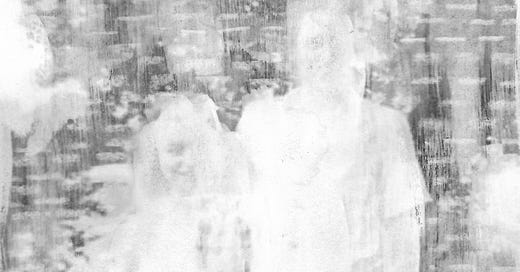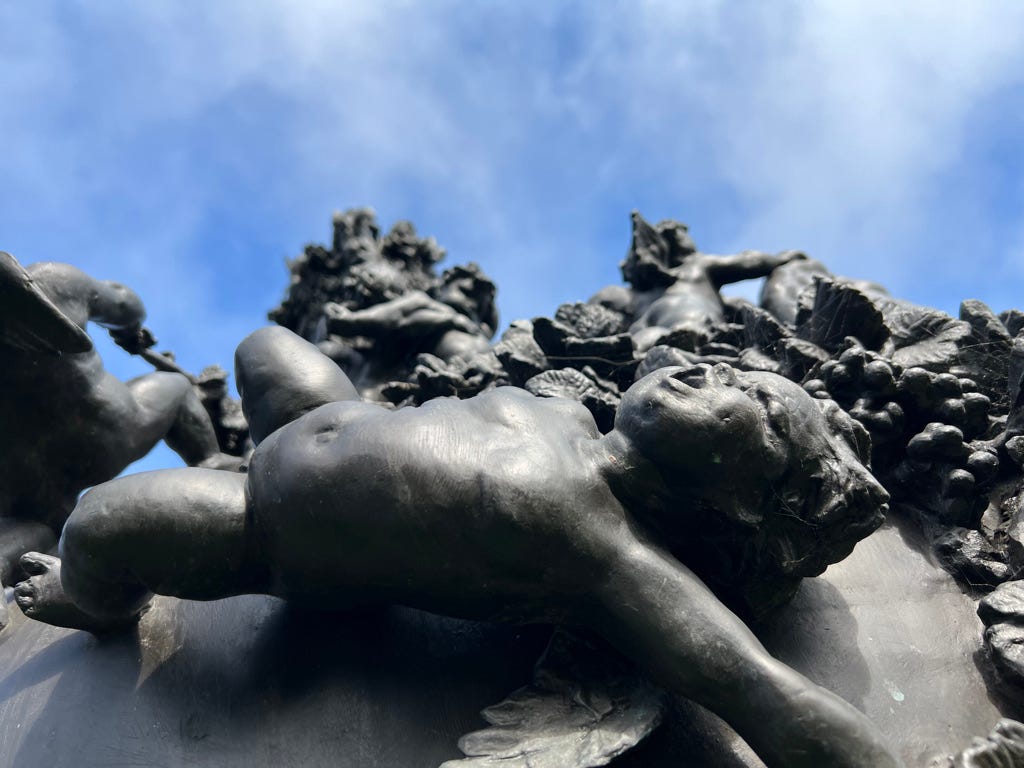“Something is missing. Something has been lost. I believe this is at the heart of why I write.”
—Sigrid Nunez, The Vulnerables
Loss has been on my mind of late because this promises to be a summer of loss for me.
Although I suppose all of life is a continual process of loss, so every season is a season of loss in its own way.
I once heard “mid-life crisis” defined as a process of “mourning the passage of one’s youth.” That has always seemed like an accurate definition to me, whether the crisis manifests a red convertible, a pilgrimage, or a commitment to eating organic vegetables and exercising regularly.
Life is a process of losing things, shedding things, having things taken away from you, yet also coveting them, wanting to keep them, and then feeling cheated when they pass.
Something is always missing. Something has always been lost.
I’m thinking right now of one particular leather wingback chair in my mother’s living room. It’s a leather chair where I have sat and read since I was a child. On breaks from college. On holidays. On escapes from daily life. In the early mornings and late at night.
It’s more than a chair.
The chair is one part of a pair that my parents bought on a vacation when I was eight or so years old. An extravagant purchase for them at the time, but one I’ve always thought of as the best dollar-for-dollar investment of their lifetimes.
I’ve always felt my most creative in the chair. I do my best reading. I get my best thoughts. I don’t know why. Perhaps it’s being home, feeling cared for, feeling the space of a younger self opening instead of my older self constricting around work and duty.
I always thought the chair was where I’d spend years reading and thinking after my mother died, meandering through thoughts and grieving and writing. The chair holds the comfort of timelessness for me. A sumptuous refuge.
But this summer my mother is moving to an assisted living center (another loss), and we have to sell most of her things (since she was an avid antique collector, this is no easy task), and then we have to sell the house. The hard numbers of life don’t allow for sifting through items and memories.
A while back, I concocted a scheme to preserve the house and everything in it by raising money to buy it and then starting a nonprofit that would offer a fellowship each year to a writer who would live there and teach a writing class at the local library or host a reading series at the local bookstore (The Book Vault—a beautifully renovated old bank).
It’s a small town. A fellowship like this could make a big difference. But I didn’t have the time to accomplish this (if you’re a wealthy person who wants to help fund this, please contact me).
So the chair, the house, my sense of the place as refuge and inspiration and home, falls in the category of what Judith Viorst calls a “necessary loss”:
“When we think of loss we think of the loss, through death, of people we love. But loss is a far more encompassing theme in our life. For we lose not only through death, but also by leaving and being left, by changing and letting go and moving on. And our losses include not only our separations and departures from those we love, but our conscious and unconscious losses of romantic dreams, impossible expectations, illusions of freedom and power, illusions of safety—and the loss of our own younger self, the self that thought it always would be unwrinkled and invulnerable and immortal.”
Losing the chair’s numinous magic leaves me a little adrift; it magnifies the essential fact that we are alone, on our own, and we can’t protect and preserve the things we love because there are always greater forces at work, making us vulnerable, per the title of Sigrid Nunez’s novel.
I’m the nostalgic one in the family. I might have been voted “Most Likely to Move Furthest Away” in my high school class, but I have a deep attachment to places and people.
Perhaps, like Nunez, this is why I write: to somehow find my way through loss.
“These losses are a part of life—universal, unavoidable, inexorable,” said Viorst. “And these losses are necessary because we grow by losing and leaving and letting go.”
Perhaps. But I wouldn’t mind not growing for a while. Or not growing so much. And not losing so much1.
Because the art of losing isn’t hard to master
The art of losing isn’t hard to master; so many things seem filled with the intent to be lost that their loss is no disaster. Lose something every day. Accept the fluster of lost door keys, the hour badly spent. The art of losing isn’t hard to master. Then practice losing farther, losing faster: places, and names, and where it was you meant to travel. None of these will bring disaster. I lost my mother’s watch. And look! my last, or next-to-last, of three loved houses went. The art of losing isn’t hard to master. I lost two cities, lovely ones. And, vaster, some realms I owned, two rivers, a continent. I miss them, but it wasn’t a disaster. —Even losing you (the joking voice, a gesture I love) I shan’t have lied. It’s evident the art of losing’s not too hard to master though it may look like (Write it!) like disaster.
Perhaps my favorite poem. I once memorized it so that I could ponder it in moments of loss. Each time I read it, I hear the poem differently.
Because I’m available for book coaching and editing!
I’ve been a writer, editor, and publisher. I’ve also written extensively about creativity in numerous books and articles, talked with 300 writers on my podcast, Write-minded, led the largest writing event in the world, National Novel Writing Month, and …. well, I’ve just immersed myself in all things writing for a lifetime.
I bring this wisdom and more to my one-on-one work with writers.
Because end notes
What I’m reading: Nick Flynn’s Low. Because I don’t read enough poetry. Because I’ve always meant to read Nick Flynn. Because a friend randomly suggested it. Because sometimes randomness is predestined.
What I’m watching: Her Smell, starring Elisabeth Moss, because I just discovered it’s on Kanopy, my new favorite streaming service (all you need is a library card to use it). Kathleen Hanna’s new memoir, Rebel Girl, put me in the mood for some punk rock drama.
What I’m listening to: "Dog Days," by Dehd, because my friend Patrick sent the song to me and said something like, if you play this now, you will have listened to it 15 minutes before hipsters across the country start playing this all the time. I’m in.
What I’m photographing: A statue outside the de Young Museum.







Powerful piece and reflection. Pardon the length of my comment. I’m drawn to listening to people who write or speak of loss. Always have been. Even taught a class in college on Death and Dying. This kind of loss really pulls at the heartstrings of our own mortality and why we matter—the acknowledgment and acceptance that no one leaves this earth alive. Imagine if you can, the stirring emotions you’ve just unveiled, experienced at first age 11 and then 14—growing up without parents and no home to go home to, ever again. The raw emotions of loss and grief followed me everywhere, even into adulthood, (because grief has no timeline, nor pull date), and yes, became my muse, to make some kind of sense of it all--taking control of the narrative, so it would not devour or destroy me. A lifetime later, the one area of loss I still focus on and write about in depth, is offering the question–what was it you lost when your innocence was first shattered, and life as you knew it and believed it to be abruptly changed? I’ve learned, without that answer, we fill that void with many things, even sabotage our lives searching for the answer. Yet once discovered, not only can we give to ourselves that which we lost, that answer also becomes a very powerful muse with a courageous voice, sharing experiences and vulnerabilities from our emotional journey through the human experience. What was lost when my innocence was first shattered at age six? Unconditional love. Something I now generously give to others and myself, along with compassion for surviving without it for so many years. It’s paramount to my healing and writing—my ability to share my story and truth. Mid-life crisis—that’s when I finally completing broke down and broke wide open—and met the real me—the me I was before innocence was lost. Welcome the muse. Welcome the opportunity to create the narrative and make sense of it--to put emotions into words. It's a gift. Don't squander it.
… just WoW!
This hit me on so many levels. Loss became my unwanted muse 11 years ago after my daughter crossed over. I have been processing it through poetry and a graphic novel hybrid project, which I finally figured out the ending last night.
Finally did major spring cleaning this year, learning to let go, decluttering has freed my mind. My writing is starting to flow better.
Still not an easy process, yet very helpful.
Thank you 🙏 ☺️